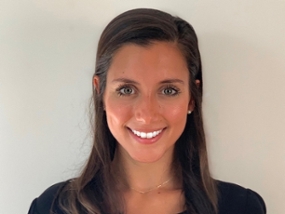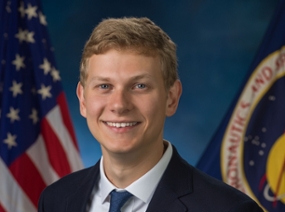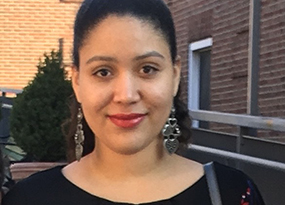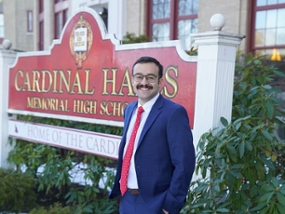Young Alumni Share How College Shaped Their Career Success
Manhattan College students might have different career journeys they begin after graduation, but what they have in common is their education. All of the below alumni had experiences on our campus that uniquely laid the foundation for what came next.
Enjoy a few stories of young professionals who started in the O’Malley School of Business, and the Schools of Education and Health, Liberal Arts, Science and Engineering:
-
Carol Magalhães, CFA ’16

Associate, Event Driven Desk at Goldman Sachs
O’Malley School of Business, Majors: Economics and Finance
I perform analyses on mergers and acquisitions, special purpose acquisition companies and corporate action situations. I started at Goldman Sachs after graduating from the University.
How the University prepared me for my career:
Aileen Farrelly '95, CPA, MS, assistant dean for the O’Malley School of Business, was extremely helpful in making sure I was engaging with alumni and attending events on and off campus through the Passport Program. Different perspectives helped me understand what paths my career could take. I would highly recommend taking classes with both Amira Annabi and Hany Guirguis, whose classes were essential in challenging me academically. Manhattan also offered a Chartered Financial Analyst (CFA) prep course, which inspired me to go through all three levels, become a Charterholder and prepared me for when I transitioned into the more analytical/technical role I am currently in.
At the University, I participated in the Fed Challenge, which teaches you a ton about macroeconomics and how the Federal Reserve works. I was also president of the Economics and Finance Society, a member of Jasper Investors, Beta Alpha Psi and the Financial Management Association.
Advice for current and future students:
Stay intellectually stimulated. You want to make sure you are moving forward and managing your own career from early on – staying motivated and not settling will go a long way. Also, network, network, network! Find ways to connect with alumni, and maintain those relationships. Mentors are extremely important to move your career forward, so any chance to develop a close relationship with someone (especially a Jasper) whom you can then trust and ask for advice and guidance, is priceless.
-
Chris Hoey ’17
Federal Legislative Assistant, city of Chicago
School of Engineering, Major: Electrical Engineering
Within the Mayor's Office of Intergovernmental Affairs, I manage federal grants communications and applications to ensure adequate federal funding for the city of Chicago. I also identify, establish, and communicate the city of Chicago's federal priorities to the legislative and executive branches of the U.S. government.
How the University prepared me for my career:
After graduating with a bachelor's degree in electrical engineering and exploring two separate internships in that field, I found that I was much more motivated by social injustices. Following a discernment process with Campus Ministry & Social Action, I chose to do a Jesuit Volunteer service year in Cleveland, OH, where I worked with immigrants and refugees on their paths to citizenship. Working as a community organizer gave me a new perspective on policies and their implementation, so I went to serve as a Cleveland Foundation Public Service Fellow. This set me on a path to pursue a Master's of Public Policy at Loyola University Chicago.
Manhattan University laid a foundation that I am thankful for every single day. Other than proving to me that I was not bound by my circumstances, Manhattan University's Campus Ministry & Social Action and the Center for Career Development taught me to pursue what I was passionate about, frame myself how I would like to be seen, and to stay grounded in my values while doing so.
Advice for current and future students:
Make sure that wherever you apply to, the company or organization’s values and mission align with your personal values and personal mission. Money is great, but happiness and staying true to yourself is possible in a professional setting, if you look hard enough.
-
Josh Kivijarv ’17

NASA Johnson Space Center, Engineer
School of Engineering, Major: mechanical engineering
I work for the engineering company KBR at the NASA Johnson Space Center, based in Houston, TX. I found out about my position in the Flight Operations Directorate (FOD) through Dr. John Leylegian in the Mechanical Engineering department. He connected me with Matt Dunne ’12, who also worked in this sector. Specifically I work on the Operations Support Officer team, which is the Mission Control console responsible for International Space Station (ISS) In-Flight Maintenance. I train astronauts and flight controllers, support maintenance from mission control and write maintenance procedures for crew execution to repair or improve the Space Station. This place has some of everything, allowing you to be creative, technical, and interpersonal all at once. It also requires you to bring your “all” to work every day, and constantly push yourself to learn and be the best version of yourself.
How the University prepared me for my career:
My bachelor’s in mechanical engineering provided a strong and broad technical foundation to start my career. The department is filled with faculty invested in seeing their students succeed both before and after graduation. No engineering job relies on a technical degree alone, though, and Flight Operations in particular requires a unique mix of technical and soft skills that aren’t all found in the classroom.
I had the chance to expand these critical soft skills through opportunities like Lasallian Outreach Volunteer Experience (L.O.V.E) trips, on-campus employment in the Center for Academic Success and ITS, and through the university’s required humanities courses. Meghan Makarczuk, then of the Center for Career Development, was also instrumental in guiding me through my professional development journey, all the way from zero prior work experience to where I am today.
Advice for current and future students:
Try as many new things as you possibly can, and don’t stop or limit yourself until you have found your passion. When you chase passion you will naturally find success and fulfillment in what you do, so never settle for anything less.
-
Analisse Rosario ’17

Process Design & Hazard Evaluation Scientist, Bristol Myers Squibb
School of Science, Major: Chemistry
After graduation, I landed a contracting position with ExecuPharm, where my client was the pharmaceutical company Merck & Co. My next contract was with Merck's Environmental & Process Safety Engineering group. This role is where I discovered that I really enjoy process safety, which defines the safe operating space of a process for developing different medicines in the lab and on a larger scale.
My role at Bristol Myers Squibb is equally lab-based and office-based. In the lab I use analytical instruments to identify the safe operating spaces of processes. We also characterize drug substances and drug products to make sure that they are safe to ship and handle in bulk quantities. From my office I report my findings to the respective teams.
How the University prepared me for my career:
I would advise all School of Science majors to be involved with as much research as possible. The lab experience is very valuable, and learning how to document your experiments and results are crucial. My research adviser John Regan, Ph.D., chemistry and biochemistry professor, helped me learn self-sufficiency. Many times when I asked him "What should I do next?" he would always respond, "If I wasn't here what would you do?" That is crucial in learning how to think critically and really understand the purpose of the task you are performing. Similarly, having a chemistry background in an engineering environment is useful for my specific profession as I am familiar to energetic groups found in molecules.
Another way the University helped me is through networking. As I was graduating MC, I began reaching out to alumni. I was then introduced to Roy Helmy ’99, Ph.D., who was my first manager in ExecuPharm.
Advice to current and prospective students:
I would recommend networking with as many people as possible. Reach out to people in the field and get advice and stories first hand. When opportunities come up, you want your name to pop up in people's minds. Getting involved in clubs and organizations is a great way to network as well.
-
Olivia Smith ’17
Instructional & Legal Technologies Librarian and Lecturer in Law, Cardozo Law School
School of Liberal Arts, Major: Sociology
My job at Cardozo falls into three broad categories: reference, instruction, and instructional support.
Together with four other members of the reference team, I answer questions from students, faculty, staff, and alumni ranging from “Where can I find this book” to “How do I research this topic?” Reference librarianship is fun because you never know what question will come next.
I teach a section of Advanced Legal Research (ALR) — a mandatory class for Cardozo students — each semester and during the intersessions. I provide research trainings for faculty members and research assistants, plus trainings on research and citation for student members of academic journals. I also offer support for first-year students in their brief writing courses, assist faculty members with their education technology-related questions and research, and propose new legal and educational technologies for the school to consider purchasing. It’s hard work, and during the pandemic involves lots of Zoom meetings, but it is fun and fulfilling. The moment that you can tell a student gets it, where you see it all click – that’s what I love about teaching. Legal research can be tedious and complicated, and I like having the chance to simplify the concepts to make them workable for my students.
Tell us about your journey to become a legal librarian. Did you always want to do this as a profession? Teaching: what do you enjoy about teaching?
I started law school at the CUNY School of Law three months after graduating College; I was among the youngest in my class. After my first year of law school, I secured an internship with Legal Momentum, a women’s rights nonprofit. My responsibilities there were diverse, but they all had one thing in common: research. Some of the research was legal and some interdisciplinary, and I loved being able to find information that would help my organization, our clients, and our cause. While at Legal Momentum, I spent a few days volunteering with Safe Horizon, a nonprofit that, among other things, provides support to individuals seeking restraining orders in family court.
After my court experience, I quickly realized two things: I loved research, but I did not love the legal profession. I did not want to drop out of law school – I’d already put in a year of my life to the degree, and I did enjoy it – but I knew I did not want to be a lawyer. I contacted my Legal Research professor at CUNY Law and she mentioned law librarianship as a profession. I was immediately sold on the profession, and within months had applied and been accepted to the Graduate School of Library & Information Science at Queens College. In May 2020, three years after I received my bachelor’s from Manhattan, I graduated from CUNY Law with my J.D. and from Queens College with my M.L.S.
How the College prepared me for my career:
For law and law-related subjects, the most important skill you can learn and hone as an undergraduate are critical thinking skills. I credit my liberal arts education – I majored in sociology and had double minors in ethics and music – with those skills. My capstone course for the Sociology major broadened my understanding of research and introduced me to many of the interdisciplinary research skills I use at work every day. Philosophy classes helped me learn how to read, think, and talk about complicated and amorphous concepts, which much of the law is.
While at the College, I worked in the Center for Academic Success as a writing consultant, where I learned how to teach non-doctrinal subjects – research, writing – to undergraduate and graduate students. Through that position, I learned just how much I loved teaching, and I was able to develop strategies for reaching students at varying levels of expertise and understanding.
Advice to current and prospective students:
Don’t be afraid to change your mind about what you do. I set off to College and law school with a specific goal, and when I realized lawyering was not the career path for me, I panicked. I was terrified to tell the world that I was wrong and had cornered myself into a profession that I thought was perfect. But telling my friends and family about my decision to alter my career path was liberating. At age 18 we are asked what we want to do for the rest of our lives – of course some of us will have a change of heart at some point. Maybe more than once. Changing your mind – be it while you’re studying at Manhattan, or as soon as you graduate, or when you’re 35 – is perfectly fine, and it might even lead you to places you did not know existed. I would have been a miserable attorney. Having the courage to change my mind and admit it out loud led me to the career and workplace that I love.
-
Robert (R.J.) Liberto ’16

Dean of Studies, Cardinal Hayes High School
School of Education & Health, Major: Secondary Education in Social Studies, Grades 7-12
I began as an English teacher and was encouraged to apply by two Jaspers who were already teaching at Cardinal Hayes. At that time there were at least 20 folks working in our school building as administrators, staff, and teachers who were alumni of Manhattan University ranging from the 1970s to 2016.
In my current position as Dean of Studies I work closely with our principal and assistant principal for academic affairs in setting curriculum and programming for the school. I also supervise instruction and assessments, and work with students of all grades, mostly when the student is underperforming academically. I enjoy working with parents and students to look for solutions to academic issues. The pandemic has been the biggest inhibitor to education in American history. Radical educational solutions are required to address the obstacles of student engagement and motivation. I have learned a great deal taking on the many overwhelming challenges that have popped up over the last year.
At this time I am still able to teach one class. I love teaching and could not see myself completely out of the classroom. Teaching in the classroom is a special energizing feeling that is difficult to describe and is totally addictive.
How did the University prepare you for your position/career?
I directly attribute my success to my time learning at Manhattan University, as well as the tight-knit Cardinal Hayes family that helped me learn the art of practical teaching and how to grow as a professional. At the University, I will always credit the amazing professors I had in the History department, including Drs. Julie Pycior, Paul Droubie and Jennifer Edwards, and in the Education department, Sr. MaryAnn Jacobs and the late-greats Brother Raymond Meagher, FSC, and Dr. James Harten. I would also credit my time working in the Writing Center for the one-on-one experience I am often tasked with in my position. As for my interpersonal skills and ability to think on my feet, I have to credit my time with the improv group Scatterbomb and our coach Tarik Davis.
Advice for current students and prospective students:
Take advantage of all opportunities that come your way both at Manhattan University and in life. I met many people who have impacted my life for the better at Manhattan University and elsewhere on my professional journey. Be open, communicative, and optimistic and many opportunities can be within your grasp.